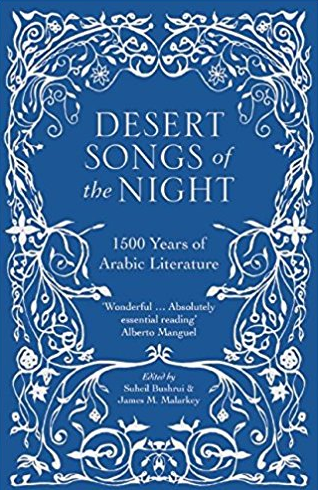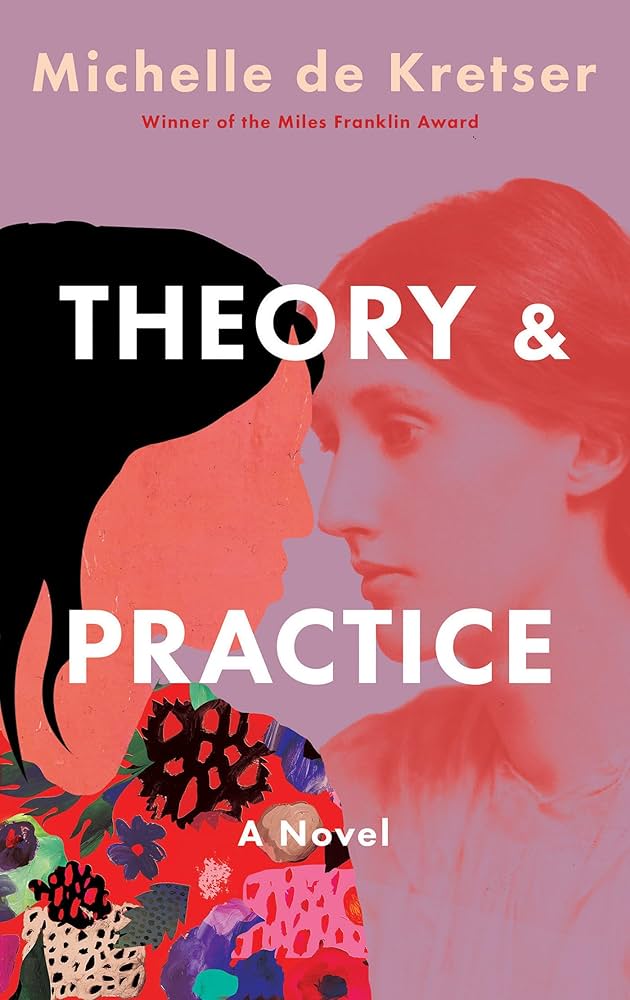Book by SUHEIL BUSHRUI and JAMES MALARKEY
Reviewed by

Suheil Bushrui and James Malarkey’s anthology, Desert Songs of the Night: An Anthology of 1500 years of Arabic Literature, is not aptly named. The romantic title conjures up an image of a bard, reciting poetry and telling stories in the Arabian desert by a fire: the very best poetry and tales from the Arabic literary tradition. In fact, the anthology is a collection of a wide range of texts, reflecting the rich cultural history and thought of Arabic heritage: chivalric verse, political, philosophical, and legal treatises, religious texts, moralistic essays, folktales, travel writing, excerpts from plays and memoirs and modern narrative poetry.
The collection is tempered by the academic backgrounds and interests of the two editors. Suheil Bushrui, who died last year at 84, was a distinguished critic and translator, an authority on Yeats and Kahlil Gibran and the founder and former director of the George and Lisa Zakhem Kahlil Gibran Center for Values and Peace at the University of Maryland. James Malarkey was Professor Emeritus at Antioch University, the former Chair of Humanities and General Education with past stints at universities in Algeria and Beirut. He is an anthropologist, specializing in Algerian politics.
Compiling an anthology presents difficult choices. Even an editor who takes on a mere hundred years will find it hard to narrow the field. What about 1,500 years? While Bushrui and Malarkey should be applauded for undertaking such a mammoth project, the swath of history they chose may have made the herculean task almost impossible since they did not restrict by genre. As they note in their introduction, the book is the first sample of all Arabic literature, ancient and modern. One wonders how long it must have taken them! The anthology is 480 pages. The organizing principle of the collection is historical period, each containing samples of seven or eight translations starting with the Pre-Islamic or Jahliyya Period and then, moving through the Islamic Age, The Ummayad Dynasty, The Abbasid Dynasty, Al-Andalus-Spain, The Age of Depression, and Renaissance and Modern Literature.
I felt as if I had arrived at an extravagant royal Tudor banquet with an overwhelming selection of dishes, not all tasty or palatable: hare, sturgeon with parsley and vinegar, stuffed porcupines and peacocks, herons, stag in salt, wafers and jelly, rich custards and cheese. As the colloquial Egyptian Arabic saying goes, “Samak, Laban, Tamar Hindi” or “Fish, milk and tamarind.” The dishes are an odd mélange. Fewer dishes, more carefully selected would have made for a more delicious and satisfying meal—the literary equivalent of a Lebanese meal: hummus, kibbeh, green salad, and grape leaves with a main dish of marinated grilled lamb chops, not overcooked.
Some of the selections are entertaining and will appeal to the uninitiated reader of Arabic literature: the bawdy poet, Abu Nuwas from the Abbasid Dynasty; Ibn Al-Muqaffa’s fable “The Rabbit and the Elephant” from the Ummayad Dynasty and selections from the Arabian Nights and The Romance of Antar from the Age of Depression; and Ahmad Shawqi’s Act I of Majnun Leila from the Renaissance. It is impossible to dislike the playful, humorous Abu Nuwas: “Four things banish grief and care / Four sweet things incline / Body and soul and cyne / To enjoy, if they be there / water, wine / gardens bright and faces fair.” The entertaining romance of Antar and Abla (the equivalent of Romeo and Juliet) and the fabulous tales from The Arabian Nights do fit the title and make a reader hungry for more.
Imaginative literature needs no apology. Given the extremes of Middle Eastern politics, however, it was inevitable that politics would enter this anthology. However, in their introduction, Bushrui and Malarkey do their book a disservice by stating that their agenda is to counter negative, violent images from the region on television after 9/11 attacks in the United States: “The current wars and political crises in the heart of the Arab world would have further fuelled this negative imagery of a region appearing to seethe with violence and bloodshed, with instability, spreading beyond borders and democracy, peace and justice an even more distant dream.”
I agree there are plenty of unheard narratives other than the ones the media presents to us about the Middle East, but literature should not be reduced to sound bites or propaganda for a culture or a civilization. After acts of violence and bloodshed, people want to respond in a positive, peaceful way. Maybe the idea for this anthology was born from the same good, noble intention. Surprisingly, Bushrui and Malarkey state that “the aim was not to choose the best translations,” but to provide a wide-ranging spectrum of texts and translations from across the centuries. Why? More discerning selections of the most talented writers and more eloquent translations would have served as a more authentic bridge from Arabic to English and foster a better understanding of Arab culture.
Many translations will not seduce the newcomer to Arabic literature—some are old-fashioned and stilted, especially the texts from the Jahliyaa Period or Pre-Islamic period, which open the anthology. Sir William Jones’s translation of “Ode of Imru Al-Qais,” the first love poem in the anthology, reminds me of Lord Alfred Tennyson and made me giggle, not swoon: “Then gushed the tears from my eyes, through excess of regret, and flowed down my neck, till my sword-belt was drenched in stream.” The rhymes also seem heavy-handed and clumsy in Harold Morland’s translation of Abu’l Hasan Ali ibn Hisn’s “The Pigeon”: “A bough is weeping in the stream / green island, green… and I dream / A pigeon moans, disquiets me.” Do pigeons moan? One yearns for more accurate, artful translations. It is fair to point out that much Arabic poetry relies on rhyme, rhythm, and puns, which are tricky to translate well. Strip the poetry of its linguistic structure, and it can fall flat in translation.
Clearly an effort was made to choose texts relevant to the modern world; for example, Ibn Hazm’s essay on “On Anxiety,” but the writer is pompous and the text dry:
I am a man who had always been uneasy about the impermanency and constant instability of fortune. Concern of this sort have occupied me during the greater part of my life and I have preferred to spend it in pursuing these matters studiously, rather than in looking for delights of the senses or the accumulation of great wealth, which most seem to prefer.
Abd al-Hamid Al-Katib’s essay “The Art of Secretaryship,” advice for secretaries to caliphates, may be important reading for the historian, but is not a very dynamic, literary piece. Abd Al-Rahman Al-Kawakibi’s excerpt from “The Virtues of the Arabs,” which decrees that the Arabs of the Arabian peninsula should be the guardians of the Islamic tradition, is similarly dull. Al-Kawakibi, a Syrian intellectual, who criticized the Ottoman Empire and called for the sovereignty of Arab nations, spearheading the Pan-Arab movement, was a progressive, influential thinker. “An elegy to Mustafa Kamil,” a poem by Hafez Ibrahim, is also included in the Renaissance section—Mustafa Kamil demanded the end of the British occupation and was an advocate for Egyptian independence. Their prominence notwithstanding, these selections are not the finest examples of writing from the Arabic literary tradition.
Desert Songs of the Night is useful for readers in the general public who are looking for a survey of Arabic thought. Selections from the anthology could definitely be used for a university course about Arabic cultural heritage. However, the more sophisticated reader of literature will probably have read excerpts from Rumi, Gibran, Naguib Mafouz, Taha Hussein, Tewfik Hakim, Mahmoud Darwish, Adonis, and Nizar Qabanni. Translations of their texts are widely available. There are a number of other, more selective anthologies of Arabic literature: Classical Arabic Literature: A Library of Arabic Literature Anthology, edited by Geert Van Gelder, which covers the Pre-Islamic period to the 18th century. For lovers of Modern Arabic Literature, The AUC Press Book of Modern Arabic Literature, edited by Denys Johnson Davies. And for those who yearn for real poetry, When the Words Burn: An Anthology of Modern Arabic Poetry, 1945–1987, translated and edited by John Mikhail Asfour.
Gretchen McCullough is a fiction writer and translator, teaching at the American University in Cairo. Her bi-lingual book of short stories, Three Stories in Cairo, translations in Arabic with Mohamed Metwalli, was published by Afaq Publishers in 2011. A collection of short stories about expatriate life in Cairo, Shahrazad’s Tooth, was published also by Afaq in 2013.
In April 2016, The Common will release a special issue of contemporary Arabic fiction in translation.



